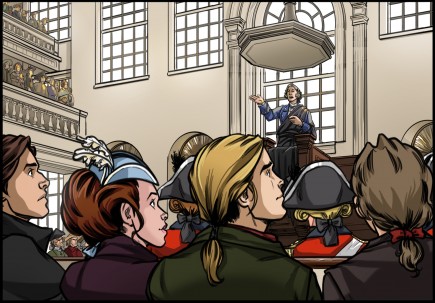Date: 1758
Author: Nathaniel Ames
July 3, 1758 “Cato a Play acted at [Joseph] Warren’s Chamber”
July 6, 1758 “Cato to Perfection”
July 14, 1758 “Cato more perfect than before.”
Sources:
Nathaniel Ames’ Diary (extracts), manuscript, Dedham Historical Society: Dedham, Massachusetts.
Ames, Nathaniel. “Year of a College Student’s Life.” In American History Told by Contemporaries, Vol II. Building of the Republic 1689-1783. New York: MacMillan Company, 1898, p. 269.
Hanson, Robert Brand ed., and Nathaniel Ames. The Diary of Dr. Nathaniel Ames of Dedham, Massachusetts, 1758-1822. 2 vols. Camden, Maine, Picton Press, 1998.
The image of Joseph Warren delivering the March 6, 1775 Boston Massacre Oration in a toga at Old South Meeting House is by modern web comic artist Lora Innes from her The Dreamer series. No 18th century images of the pre-Revolutionary War Boston Massacre Orations are known to exist.
Commentary: Nathaniel Ames III was a physician, inn keeper, almanac author, and fellow Harvard alumnus of Joseph Warren’s. Ames’ diary is a rare written record of Harvard student life in the mid-18th century. Ames documented several performances, presumably by and for fellow students, of the popular historical play Cato. Performances occurred in Joseph Warren’s dorm room at the still-standing Massachusetts Hall.
Warren’s roles in production and acting were not specified. Intriguing details of these amateur theatrics, performed at a time when professional theater was banned in Boston, remain lost to history: Were the performances partly staged or were they readings? Did Joseph Warren both direct and act? Who were his fellow thespians? Did Warren wear a toga? And lastly, of biographic interest and relevant to his fate, did Warren take the choice part of ancient Roman patriot-martyr Cato?
Cato was an influential play in 18th century Colonial America. It extolled virtuous and actively involved citizenship in the face of Julius Caesar’s tyranny. See related entry with quotes from the play. The theme of self-sacrifice on behalf of republican opposition to tyranny appealed to the likes of Virginia planter George Washington and young Connecticut school teacher Nathan Hale.
Nathaniel Ames figures in Warren’s later political and personal lives. Like Warren, Ames was a physician activist advocating Massachusetts provincial licensing of physicians as an antidote to quackery circa 1767. His inn was a focal point for the Suffolk Convention during late August and early September 1774. He provided sanctuary and medical services to Joseph Warren’s “fair incognita pregnans” beginning in April 1775.

 Follow
Follow